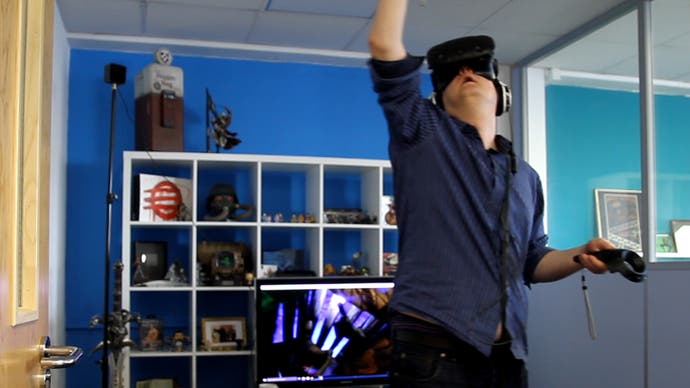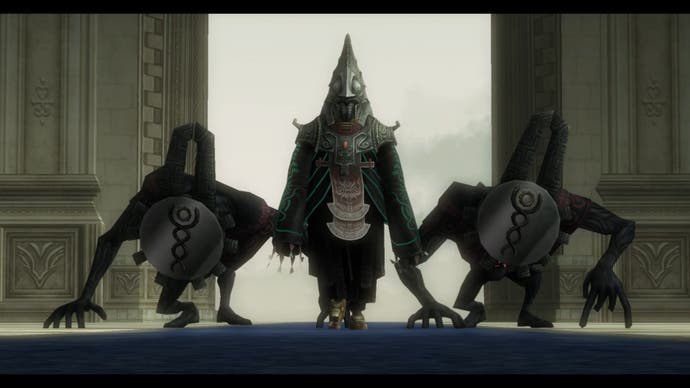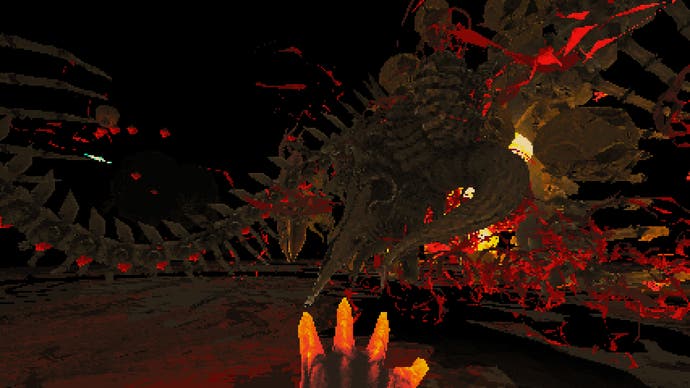In Play: Which moments in games do you really remember?
Looking back on Twilight Princess, Heavy Rain, and a few magical minutes with Vive.
I met a whale this week. I was standing on the creaking deck of a sunken ship, and I had been watching a cloud of manta rays drift past overhead when I sensed a disturbance in the water. I turned, and a whale was watching me: a vast blue whale, with that grumpy mouth and those huge, sad, very human eyes. Ancient eyes. I walked up close and peered at the whale. It filled my entire field of vision. Then it started to move on. I jumped back as its vast tail flicked, and it was gone.
All of which means I have gone through that barrier, from VR sceptic to VR convert, a path I've seen so many of my friends take. We've had Vive in the office, and a single go on the whale demo was all I needed to be left deliriously in love. VR isn't like normal games, I've suddenly understood - even though people have been saying this to me for ages. I don't think I'm going to want to explore open worlds in there, or level up, or grind for loot, or even pull off headshots. I think what VR is all about is going somewhere on your own, and meeting someone - or something - and then getting a sense that you've genuinely spent time with them. The killer app for VR, weird as it sounds, may be communion.

And that fits with something else that often gets discussed when VR comes up. How long do you want an experience to last? Two or three minutes was about right for the whale. Any longer than that and I would have been hunting for glowing weak spots. Afterwards, I watched John Bedford poke around in a kind of wizard's dungeon, and I reckon that would have lasted me five or six minutes tops. VR is going to require strange things from developers, in other words, because I doubt that the usual stuff is going to work any more. Weird as it sounds, from my - admittedly - brief encounter, it seems to require some kind of creative compression tricks. In an age of expansiveness in gaming, developers may have to find how to make something very small and very short feel very rich. Delight and bedazzlement are perhaps not states that can be extended indefinitely, and I'm genuinely excited to see how designers deal with that.
This week's releases have made me think about this idea in a different way, to approach it from a different angle. Here's a question: how do games live on in the memory? I think they live on a bit like that whale demo: I tend to remember one thing very brightly, and how I feel about that, over time, comes to stand for how I feel about the game in general. Take The Legend of Zelda: Twilight Princess HD, a remaster of perhaps the strangest Zelda yet made. On paper, I know what this game is: an apology targeted at all the people who hated the direction The Wind Waker took, a Zelda that was exhaustingly vast, enormously difficult, and as close to realism in its art style as a Zelda game is ever likely to get (which, thankfully, isn't too close). People cheered so loudly for it because finally Nintendo was listening! Finally it was giving them more of what they said they wanted. Maybe the Wii itself would follow suit, eh?
In truth, though, what I actually remember of Twilight Princess is one perfect dungeon, which my memory has put up in the mountains somewhere. It's snowing, and there are icicles hanging from wooden lintels, and as I bodge about, unlocking the map and solving puzzles, something far more domestic is going on around me: someone is making soup.

That's Twilight Princess for me: a game that could still find a strange note of cosy sweetness in amongst all the bluster. And apparently there's room for other surprises too: "You'll also find melancholy seeping into every corner of the land," writes Martin in his review. "The overworld of Hyrule itself is often encased in the darkness of the Twilight Realm, yet even once liberated it's still cast in an autumnal light. In those bruised peach skies and yellowing grass you can feel the chill of a summer dying as winter rolls in. Twilight Princess doesn't quite have the twisted mischievousness of Majora's Mask, another notoriously downbeat Zelda, instead offering a softer, more muted tone."
And since Zelda isn't the only re-release this week, let's revisit the work of David Cage (a remaster double-bill of Beyond and Heavy Rain is out now for PS4). Heavy Rain, in my memory, becomes a scene in a convenience store: a robbery that I can foil, a moment of potential heroism or cowardice handled with a magnificent lack of finesse, mostly due to conveniently scattered potato chips that pull you right out of the action and remind you of the puppeteer director, twanging unmusically at the strings. While my memory of Zelda feels slightly misleading - that dungeon is representative of the series rather than the specific game in question - my recollection of Heavy Rain feels spot on: it looks like cinema, but in actuality it is all about the backstage stuff, an accidental examination of how hard it is to lure players onto their marks, to have them look the right way at the right moment, and to do all this without abusing them so much in the process that the whole thing becomes accidentally hilarious. (And accidental hilarity probably covers Beyond off, too.) Still, with a bit of hindsight, there is a heroism to all of this. Cage is attempting a synthesis of two things that do not want to come together cleanly. His games tend to be weird and occasionally embarrassing, but nobody who's trying something bold should ever be afraid of a little embarrassment.

What's next? Black Desert Online, a game in which the iconic moment comes before the adventure has even kicked off. Like APB before it, this MMO is in danger of being rendered invisible by the sheer brilliance of its character creator, but as Rich Cobbett argued, there is more to it than that: "It's a game that's at least trying a little more than the average new MMO," he writes, "combining some fun ideas with decent combat and absolutely top-tier graphics that make exploring its world a pleasure, and that world actually feels like a place instead of just another monster arena. At the very least, it's pushing that sense more than most, with an excellent engine and look."
And beyond that, Devil Daggers offers a game in which the defining moment is basically the whole thing: a thrilling and claustrophobic score-chasing blaster where your only job is to survive for as long as you can. Generally not very long. "In short, Devil Daggers manages a beautiful job of being a very short experience and setting a very long road out ahead of you," says Johnny in our review. "The instant reloads make it so easy to play just one more, but it also demands so much of you if you really want to excel. Maybe too much. At this point I'm not sure how much fun I'm actually having with Devil Daggers but, all the same, it's a difficult game not to love." Sounds good. After all, it's the love you tend to remember.

